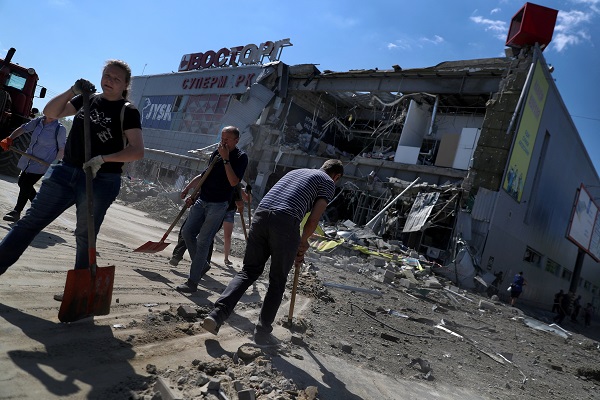 File photo: Local residents remove debris from a supermarket in a shopping mall damaged by a Russian missile strike, in Kharkiv, Ukraine, 8 June 2022;
Credit: Reuters/Ivan Alvarado
File photo: Local residents remove debris from a supermarket in a shopping mall damaged by a Russian missile strike, in Kharkiv, Ukraine, 8 June 2022;
Credit: Reuters/Ivan Alvarado
PRAGUE/WARSAW (Reuters) - Central European companies are scouting out locations, signing contracts and launching projects deep in war-torn Ukraine, seeking a foothold for future reconstruction work that could be worth hundreds of billions of dollars.
While most current projects are focused on essential infrastructure damaged or destroyed since Russia's February 2022 invasion, company executives and government officials anticipate a wave of investment once fighting ends.
"It will be precisely the countries unafraid to go to Ukraine now that will start from the front positions of the peloton" when reconstruction begins in earnest, said Tomas Kopecny, the Czech government envoy for Ukraine reconstruction.
The Czech government has pledged to spend 500 million crowns (approximately $23 million, or €21 million) each year through 2025 to support firms seeking to work in the country and is helping its companies build contacts with Ukrainian officials via regional trade missions.
"Companies and governments realise that the Ukrainian market will be a great opportunity for the future," said Kopecny, who expects revenues earned by Czech companies in Ukraine to increase several-fold in the coming years. "The reconstruction of Ukraine, at least its first phase, is already underway."
Reuters spoke with around a dozen company executives and government officials who detailed operations and plans in Ukraine even while the war, which has killed tens of thousands, caused millions to flee and flattened cities, continues.
The stakes are high. The cost of recovery is likely to be $411 billion, or 2.6 times Ukraine's estimated 2022 GDP, according to a joint assessment by Ukraine and the World Bank.
Polish bank Pekao SA has estimated that reconstruction could boost neighbouring Poland's economy by up to 189 billion zlotys ($45 billion, or €42 billion), or around 3.8% of GDP.
"When the war ends, money will go to Ukraine and it will be a very large construction market, maybe one of the largest in Europe," said Leszek Golabiecki, deputy chief executive of Polish construction firm Unibep.
Traditional allies
Strong military and political support for Ukraine from the Czech Republic and Poland, countries dominated by Moscow during four decades of Communist rule, has helped their firms. So has their similar culture and experience working in Ukraine.
Czech environmental services firm Dekonta, which cleaned up sites after the Soviet military left in 1991, is searching for locations to build water treatment plants, said supervisory board member Pavel Mothejl. He recently visited Dnipropetrovsk region, near the front line in eastern Ukraine.
"We would like to do eleven water treatment stations and [are] preparing decontamination projects for when the war ends," said Mothejl, whose firm has one project in progress and another in the pipeline. "Wherever you go in the villages there is demand."
More than 2,300 Polish firms have sought to participate in reconstruction projects as part of a Polish Investment and Trade Agency programme, mostly companies in construction and building materials.
Poland is also in discussions with representatives from countries including South Korea, Japan and the United Kingdom to partner with Polish companies more familiar with Ukraine, said the head of the state-funded agency's Kyiv office, Karol Kubica.
"We are building relationships with local governments because we want to start the reconstruction from the bottom," he said. "The challenge is and will be how to safely send employees to carry out work."
Foreign firms working in the country must deal with regular air raid sirens and some employ military consultants.
"We have an air raid alert app installed on our mobile phones," said Jaroslav Camfrla, a project manager for Czech healthcare company Block CRS, who has visited Ukraine to gauge demand for its sterile surgery wards and mobile hospital units.
Poland's 530-km border with Ukraine could make the country a natural logistics hub.
"We expect Polish products to be the first choice and we also have the advantage of transport costs because we are closer to Ukraine," said Krzysztof Krempec, president of fire protection system maker Mercor. It is considering increasing the capacity of its factory in Lviv, western Ukraine.
Corruption concern
While many central European firms see a once-in-a-generation opportunity, progress will depend on the ability of Ukraine's authorities to demonstrate transparency, said Wieslaw Nowak, chief executive of Polish construction company ZUE.
Transparency International's Corruption Perceptions Index puts Ukraine in 116th place, far below its European Union neighbours. Ukraine has prioritised efforts to tackle graft as it seeks accession to the EU.
"If there is no transparency of economic processes, fair tenders, transparent spending and settlement of these funds, no one will invest in Ukraine," said Nowak. "This is the main challenge for Ukraine."








